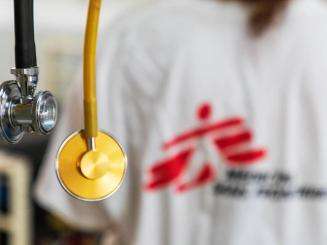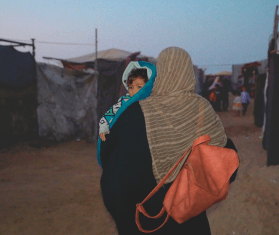Since April 15, intense fighting has been taking place between the Sudanese Armed Forces and the Rapid Support Forces in Khartoum and other parts of Sudan. Many people, including health care workers, are currently trapped by the fighting, and the situation is dire.
Below, Dr. Ghazali Babiker, country director for Doctors Without Borders/Médecins Sans Frontières (MSF) in Sudan, shares his account of the current humanitarian emergency.
Everywhere in Sudan, and especially in Khartoum, Darfur, North Kordofan, and Gedaref states, our teams face serious challenges. Our facilities in Nyala, South Darfur, have been looted—including one of our warehouses. In Khartoum, most teams are trapped by the ongoing heavy fighting and are unable to access warehouses to deliver vital medical supplies to hospitals. In Khartoum, ambulances are being turned back. They are not permitted to pass to retrieve the bodies of the dead from the streets or to transport those who have been injured to hospital.
In Khartoum and other cities where fighting is intense, we have received reports of overstretched and closed hospitals running out of supplies, water, electricity, and fuel for generators. The staff in those medical facilities have been working nonstop since the violence erupted and are completely exhausted. Many have been on duty for many hours, providing lifesaving care in extremely difficult circumstances despite the impact of the situation on them and their own families. Additional medical staff cannot reach the hospitals due to the intense fighting and insecurity.
We are ready to provide supplies and medical personnel to key functional health facilities that need support, but it is too dangerous for anyone to move within Khartoum and other cities. We urge all parties to the conflict to guarantee the safety of medical staff and patients, so that they can access health care facilities without fearing for their lives. We additionally request that all parties to the conflict ensure that all health facilities—including hospitals, clinics, warehouses, and ambulances—are protected. They should never be a target.
April 17 02:09 PM
Sudan: Civilians wounded amid intense fighting
MSF urges all sides to ensure the safety of health workers and patients
Read more
Most of the wounded people that we’re seeing in Al Fasher are civilians who were caught in crossfire—and among them are many children. They have extremely serious injuries and, until Saturday afternoon, there was no surgical capacity in this hospital. All other hospitals in North Darfur have had to close due to their proximity to the fighting, or due to the inability of staff to get to the facilities because of the violence. As a result, over the past five days, we have received 220 wounded patients. Very sadly, 34 people have died from the severity of their injuries. Although we currently have some surgical capacity, there are only 38 beds in this hospital. There is not enough space for all the patients we need to treat, and many are being treated in the hallways of the hospital.
As things stand, the hospital is rapidly running out of medical supplies to treat survivors. It is running out of blood for transfusions. Without vital supplies, more lives will be lost. We received a list of surgical items that the surgical team urgently requires and were able to get some of these to them, but it is not enough. The airport has been closed since Saturday, and it is vital that it is re-opened so that we can bring in additional medical supplies and possibly an MSF surgical team to support the surgeons who are currently at work.
I would also like to mention that, following the military coup in 2021, most international support to Sudan was frozen and the ensuing economic crisis has increased the cost of living, resulting in increased food insecurity. The hospitals were already struggling to function due to a lack of medical supplies and the brain drain of medical personnel. Sudan´s health system has been on the verge of collapse for decades; the economic crisis and political crisis pushed it to breaking point and this latest development is going to further exacerbate the deteriorating humanitarian needs in the country, which were already at their highest in a decade.




